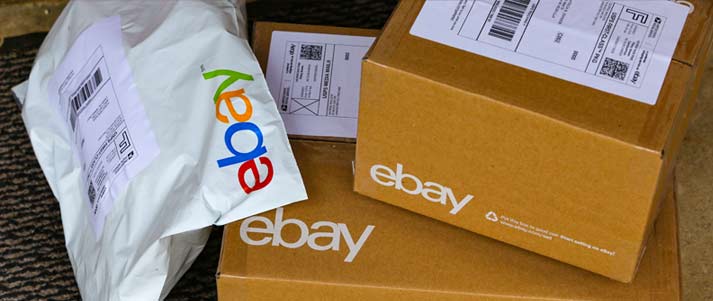17 eBay bidding tips
Are you new to eBay buying or do you fancy yourself an auction pro? Either way, follow these useful tips and tricks to buy eBay items at the lowest price.

Credit (left): Nate McBean - Flickr
When it comes to buying and selling pre-owned stuff online, eBay remains in a league of its own. Imagine pretty much anything you could ever want – there will be someone selling it on eBay.
But of the almost 140 million users, a large percentage of buyers pay more than necessary for items. All because they don't know how to find bargains on eBay.
It pays off to take your time and know your stuff in this game. We're here to tell you our eBay tactics.
How to win bids on eBay and save money
These are the best eBay bidding tips and tools for buyers:
-
Don't fall for joke listings

Credit: George Sheldon – Shutterstock
First things first. It's worth knowing that eBay sometimes makes things look more valuable than they are.
If people start bidding on something for the wrong reasons, it can lead you to believe it's very valuable – even when it's not.
For example, when the new plastic fivers were first released, they were going for £500+ on eBay if they had the first-issue serial numbers printed on them.
However, early-print fivers are pretty common now. Some unlucky people wasted a fair bit of cash on something worth... well, a fiver.
-
Use automatic bidding
Before moving to offsite eBay buying tools, you can use eBay's own function that lets you arrange for their system to bid on your behalf. This saves you from having to watch items like a hawk.
All you have to do is enter a maximum bid (instead of constantly bidding higher each time someone overtakes your bid). eBay will then automatically outbid anyone that outbids you by just a penny or two.
This way, you remain the highest bidder (up to your maximum amount) without spending a single second of your precious time bidding.
-
Search for typos on eBay
Weirdly, typos and misspellings can work in your favour if you're looking for cheap eBay items.
The unfortunate thing (for sellers) is that once an item is listed, you can only make edits before someone bids. This means they might not be able to change it once the listing is up.
If a seller accidentally types one too many 's's in their PlayStation listing (i.e. 'PlaysStation'), it'll show up in fewer searches. Therefore, it will have fewer bidders.
This tip works so well that there are even sites devoted to helping you find typo-riddled bargains. One good example is Goofbid.
-
Check the price of sold items
If you're not sure how high to make your highest bid, check how much similar items have sold for recently on eBay.
Doing this is easy. Start by typing the item name into the search bar. Then, choose 'Advanced options' and click the 'Sold listings' under the 'Search including' header.
This will show you a list of similar items that were recently sold on eBay. Plus, of course, the price.
-
Search for local items you can collect

Credit: IB Photography - Shutterstock
When it comes to larger items like furniture, cars and bikes, many eBay sellers will only allow their items to appear in searches for people based locally. For them, this eliminates the hassle of organising an expensive delivery.
But it isn't just the seller who benefits from this. For you, it also narrows the number of bidders. And this can boost your chances of getting the item at a lower price.
To do this, just scroll down on the search filters on the left-hand side and filter the search results by the distance from your postcode.
Alternatively, use BargainTi local item search. Simply enter your postcode and it'll show you everything nearing the end of an auction in your local area.
-
Don't bid on eBay auctions too early
One of our best tips for bidding on eBay is being patient. It's easy to get carried away and want to place a bid on something as soon as you see it.
However, this can work against you. It can result in a bidding war that will end with the item going for a much higher price than if everyone had waited until the end of the auction.
Instead, select 'Add to watch list'. This way, the item will be saved on your account for quick reference. Then, set a reminder on your phone to come back to it in the last 10 minutes or so of the auction.
-
Last-minute eBay bidding
With the previous tip in mind, bid as late as possible to give other bidders less time to trump you.
But what about searching exclusively for auctions that are on the brink of closing? If you find these, you can jump in at the last minute without waiting around.
Lastminute Auction is a handy site that searches for all the last-minute eBay bargains and shows you listings that are about to run out. You can even search by category to find exactly what you're looking for.
-
Become an eBay sniper
Nobody likes that guy who comes in and beats you to the crunch at the very last minute. But let's face it – if you can't beat 'em, you might as well join 'em!
These people are known as eBay 'snipers'. It's become so common that it's not even seen as cheating anymore.
There are plenty of eBay sniper tools out there. But, note that they're not always 100% reliable. After all, if two bidders are sniping, someone's got to miss out, so don't assume it's a done deal.
They also aren't totally secure, as they'll need your eBay login details. If you're going to use one, make sure you go with a reputable site like Goofbid.
Also, note that whilst sniper tools are usually free, some take a small fee if you win your auction... so they're not really free, are they?
-
Benefit from sellers' mistakes

Credit: chrisdorney - Shutterstock
As well as being able to cash in on sellers' typos, you can also find some serious bargains if they've missed a vital bit of info that would otherwise have drawn in other bidders.
For example, if someone is selling a Barbour jacket, and post it on eBay as a 'Waterproof waxed jacket in navy blue', it won't show up in anyone's searches looking for a Barbour.
No Bids is a handy eBay buying tool to check for auctions that are minutes away from ending but still have no bidders (normally due to forgetting a keyword or something similar). Worth a try!
-
Create eBay search alerts
This is a simple but effective time-saving eBay trick. You can choose to follow searches by clicking 'Save this search' at the top of the listings (it's got a little heart next to it).
This will work better for slightly more niche products. The more specific you can be about the item you have in mind, the better.
Otherwise, you'll get bombarded with notifications every single time someone lists a copy of FIFA (which is a lot more often than you think).
-
Contact eBay sellers to haggle
As eBay is an auctioning service, you might not think there would be any haggling involved. Surprisingly, you'd be wrong.
Many sellers include a 'make offer' option as well as bidding. Similarly, some sellers who use the 'buy it now' label will also consider offers. This is the perfect opportunity to show off your best haggling skills.
Of course, you don't want to go too low and put the seller off you entirely. It's best to do some research into how they've negotiated in the past.
To do this, copy and paste the username of the seller into Goofbid's best offers history tool. This will show the history of best offer items they've sold and the price they settled on. Sneaky.
-
Watch out for postage price hikes
Often sellers will try to make a bit of extra cash by bumping up the postage costs.
There are no official guidelines for sellers on what to charge for postage. You could save some money by figuring out what you should be paying. Royal Mail's price finder is the best place to start.
Don't be scared to challenge a seller if you think their postage prices are too high.
-
Look for night-time auction endings
Wondering how to win on eBay? You can increase your chances by looking for late-night auction endings.
If a seller accidentally sets an auction to end in the middle of the night, this will normally result in the item going for less as it will have fewer last-minute bidders.
Bidkit has a night-time search tool that can look specifically for auctions that are due to end in the middle of the night. The best part is, you don't even need to wake up early, as can use your eBay sniper tools (see tip 8).
-
Don't bid in whole numbers

Credit: Ascannio – Shutterstock
Say you're watching an item, and somebody else places a bid of £5. Instinctively you might want to bid £6 to trump them, but why bother with the whole pound? Why not just bid £5.50?
Unfortunately, you can't just bid 1p over your rival, as eBay has set minimum bid increments for different prices.
eBay has a handy guide to its bidding increments. This means that no matter how high the leading bid is, you can see how much (or, more accurately, how little) you need to up the bidding by to take the lead, without overpaying.
Bear in mind that the bid increments only restrict the minimum amount extra you must bid. While the bid increment could be 50p, you're perfectly entitled to bid 51p extra.
This is especially handy for outbidding other people's maximum bids. People tend to set their maximum bid as a whole number. By bidding just over a whole number (like £20.01), you could knock someone out of the auction and win by a single penny.
-
Watch out for reserve prices
If a seller is worried about not getting enough for their item, they can add a 'reserve price' on it. This means that if the bids don't meet that price, there won't be a sale.
The difficulty is that you'll only find out if there's a reserve price if you make a bid and are told the reserve hasn't been met.
If there's still time before the auction ends, it's worth reaching out and asking the seller what the reserve price is. Then, if you're the only person bidding above the reserve, you'll get it for the reserve price instead of what you bid.
-
Look at global eBay sellers
UK sellers will usually be your cheapest option. However, it's worth double-checking to see if you can get a super-cheap deal with an international eBay seller.
It might sound crazy, but sometimes even when the international postage costs are included, you can still buy an item cheaper across the water.
This is particularly the case for smaller items coming from Asia. If they're small, light and can be delivered in an envelope through a letterbox, you're not likely to have to pay customs charges either.
-
Know your rights as a buyer
The issue of consumer rights gets a bit complicated on eBay, as sometimes you'll be buying from a business and other times from a personal seller.
In the case of buying from a business with an eBay account, your full CCR (Consumer Contracts Regulations) will apply. This is the Consumer Rights Act equivalent for online purchases.
If you're buying from a person, you won't be protected by the Consumer Rights Act. But eBay does tend to favour buyers over sellers in disputes. If you're not happy, try reaching out to customer services.
Now you've mastered eBay shopping, are you getting the best price on your Amazon purchases? We've got a few Amazon shopping tips too.








